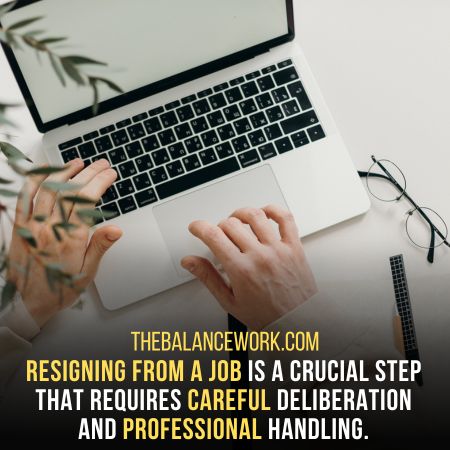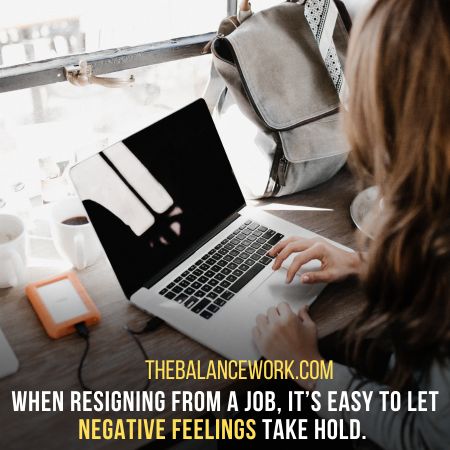Resigning from a job is a crucial step that requires careful deliberation and professional handling.
This article will guide you on how to resign professionally, ensuring that you leave on good terms and maintain valuable relationships.
We’ll explore proper etiquette, essential steps, and provide practical tips to navigate this often challenging process.
10 Tips Before You Resign in Workplace
Navigating through a job interview can often seem daunting.
However, with the right preparation and understanding of various types of interview questions, you can confidently provide compelling answers.
This article provides a comprehensive guide on common interview questions and how to adeptly respond to them.
1. Consider Your Decision Carefully
Your resignation should be a considered decision, not one rushed or made lightly.
Consider all the possible implications before finalizing your choice.
Look at available options and factors that may influence your decision such as job satisfaction, financial stability, family commitments, potential career opportunities among others.
This will help you ensure you make an informed and well-thought out decision.
2. Evaluate Your Current Job Satisfaction
Take time to evaluate how satisfied you are with your current role.
Are there areas where you can improve or are you feeling stagnant and unmotivated?
Having a clear understanding of job satisfaction will help you decide if resigning is the best course of action.
If not, look for ways to build on strengths and address weaknesses in order to maximize success in the current role.
3. Set Clear Boundaries
When resigning, it’s important to set clear boundaries and expectations that will help ensure a smooth transition after you leave.
Make sure to communicate these boundaries to your employer as soon as possible.
Be upfront about how much notice you plan to give prior to leaving, any additional help you are willing to provide in order to facilitate the transition, and any other issues that need to be resolved before your departure.
4. Prepare for Your Final Interviews
Once it’s time for your final interviews with your current or potential employers, make sure to take the opportunity seriously and prepare well.
Know what kind of questions you may be asked and practice your responses beforehand.
Be confident in your answers and make sure to emphasize your strengths as well as how leaving the current job will help you reach your career goals.
This will help ease any potential anxiety about the interview process, allowing you to focus on what you want to accomplish during it.
5. Take Care of Your Mental Health
Resigning from a job can be a difficult and emotional process.
It’s important to take care of your mental health during this time by taking breaks when needed, engaging in self-care activities, and seeking support from family and friends.
Having a positive outlook on the transition will help you stay motivated throughout the process and feel more prepared for your future endeavors.

6. Keep a Positive Attitude
When resigning from a job, it’s easy to let negative feelings take hold.
To ensure the best outcome for both you and your current employer, maintain a positive attitude throughout the process and be respectful of everyone involved.
Do not talk negatively about your past workplace or colleagues, and be sure to thank those who have helped you during your time with the company.
By keeping a positive attitude throughout your job transition, you’ll be more likely to maintain good relationships with past employers and will be better positioned for future success.
7. Stay Organized
Leaving a job can be chaotic if you’re not organized.
Make sure to make a list of all the tasks and responsibilities that need to be completed before your last day, such as returning company property or giving two weeks’ notice.
You should also create a plan for transitioning your current role, such as establishing a timeline with clear goals and outlining any resources needed.
Staying organized throughout the transition will help ensure that you leave in an orderly fashion and do not miss any important steps.
8. Seek Out New Opportunities
Resigning from a job is an opportunity to explore new career paths and find a role that better suits your needs.
Take some time to reflect on what you want out of your next position, such as a higher salary or more flexible hours.
Make sure to research potential employers and the job market as a whole to find the best fit for you.
You should also network with those in your field or industry to learn about new opportunities and make connections that can help you further your career.
Seeking out new and exciting opportunities is an important part of transitioning from one job to another.
9. Don’t Announce it to Other Employees
It’s important to be mindful of other co-workers when resigning.
Avoid telling your colleagues about your departure until you have officially given notice.
Once the news is announced, don’t spend too much time discussing it with them; focus on doing a good job and helping your team transition smoothly.
10. Express Gratitude for the Opportunity
As you prepare to leave your job, make sure to thank your manager and colleagues for the experience.
Express your appreciation for their support and guidance throughout the time you worked there.
Doing so will help ensure a positive transition and may even open doors in the future.

What if the Boss Doesn’t Accept the Resignation?
If your boss doesn’t accept your resignation, it’s important to remain calm and professional.
If you still feel that the job is not a good fit for you, politely explain why you would like to leave and reiterate that you are ready to move on.
It’s also helpful to offer assistance during the transition period, such as training the new hire or helping with the handover process.
This can help demonstrate your commitment to maintaining a positive work environment.
How to Handle Boss After Resignation
Once you have given your notice and left the job, it’s important to keep communication with your former boss professional.
Avoid speaking negatively about the company and ensure that any questions or requests from them are handled in a timely manner.
If you maintain a good relationship, it could lead to future opportunities down the line.
Reasons to Give Boss For Resignation
When resigning from a job, it’s important to provide your manager with some explanation for why you are leaving.
You may want to mention that you have been presented with another opportunity or explain how the new position will help further your career.
Or perhaps you are leaving in order to pursue a personal passion project or take on more family responsibilities.
Signs You Should Leave Your Job Because of Your Boss
If your boss has created a hostile work environment, it may be time to find another job.
It’s important to recognize any signs of disrespect or mistreatment that you’re experiencing and take steps to protect yourself and your career.
These can include verbal abuse, bullying, or unreasonable demands from the boss.
If you feel like you need to leave because of your manager, it’s important to make sure you have the proper documentation and evidence before doing so.
How Can I Write a Resignation Letter to My Boss
Writing a resignation letter is one of the most important processes when quitting a job.
It’s important to write your letter in a professional manner and mention that you appreciate your time with the company.
You should also provide sufficient notice if possible, as well as any last instructions or information that might help with the transition.
Additionally, it’s important to thank your boss for the opportunity and provide any contacts or references that could be helpful.
What to do When Boss Forces You to Sign Resignation?
If your boss is forcing you to resign from the job, it’s important to understand your legal rights and options.
Depending on the situation, you may want to consider consulting with a lawyer or other legal professional before signing a resignation letter.
Additionally, it’s important to document any instances of unfair treatment or harassment in order to protect yourself if necessary.
It’s also important to take the time to find another job before officially resigning.

Conclusion
In conclusion, navigating resignation requires tact and an understanding of your rights.
Respectful communication, thorough documentation, and professional resignation letters are key aspects of this process.
Keep your well-being in mind and remember to secure another job if possible before leaving.
Always uphold your professional integrity throughout this challenging transition.
Last Updated on 4 hours by Shahzaib Arshad
- 7 Great Signs Your Boss Wants to Help You - October 8, 2023
- How To Explain Dropping Out Of Law School? Detailed Guide - September 6, 2023
- 10 Reasons Employees Get Fired in Workplace - August 27, 2023